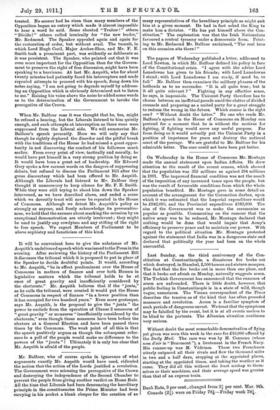When Mr. Balfour rose it was thought that he, too,
might be refused a hearing, but the Liberals listened to him quietly enough, and such attempts at interruption as there were were suppressed from the Liberal side. We will summarize Mr. Balfour's speech presently. Here we will only say that though he rightly deplored the disorder and the pitiful break with the traditions of the House he had missed a great oppor- tunity in not disavowing the conduct of his followers much earlier. From every point of view, tactically and morally, he would have put himself in a very strong position by doing so It would have been a great act of leadership. Sir Edward Grey spoke a few earnest words on the dangers of suppressing debate, but refused to discuss the Parliament Bill after the gross discourtesy which had been offered to Mr. Asquith. Although the Liberals had listened to Mr. Balfour they thought it unnecessary to keep silence for Mr. F. E. Smith. While they were still trying to shout him down the Speaker intervened, as we have described above, and ended a scene which we devoutly trust will never be repeated in the House of Commons. Although we detest Mr. Asquith's policy as strongly as anyone, and freely acknowledge its provocative- ness, we hold that the excuses about marking the occasion by an exceptional demonstration are utterly irrelevant ; they might be used to justify any rowdyism and any stifling of the right to free speech. We expect Members of Parliament to be above sophistry and fanaticism of this kind.






































 Previous page
Previous page